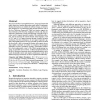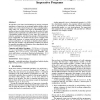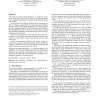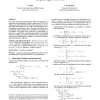199
Voted
POPL
2006
ACM
16 years 1 months ago
2006
ACM
We exhibit the rationale behind the design of Epigram, a dependently typed programming language and interactive program development system, using refinements of a well known progr...
220
Voted
POPL
2006
ACM
16 years 1 months ago
2006
ACM
The movement to multi-core processors increases the need for simpler, more robust parallel programming models. Atomic sections have been widely recognized for their ease of use. T...
243
Voted
POPL
2006
ACM
16 years 1 months ago
2006
ACM
Web applications typically interact with a back-end database to retrieve persistent data and then present the data to the user as dynamically generated output, such as HTML web pa...
164
Voted
POPL
2006
ACM
16 years 1 months ago
2006
ACM
212
Voted
POPL
2006
ACM
16 years 1 months ago
2006
ACM
We introduce a new notion of bisimulation for showing contextual equivalence of expressions in an untyped lambda-calculus with an explicit store, and in which all expressed values...
187
Voted
POPL
2006
ACM
16 years 1 months ago
2006
ACM
This article presents a polymorphic modal type system and its principal type inference algorithm that conservatively extend ML by all of Lisp's staging constructs (the quasi-...
209
Voted
POPL
2006
ACM
16 years 1 months ago
2006
ACM
This paper reports on the development and formal certification (proof of semantic preservation) of a compiler from Cminor (a Clike imperative language) to PowerPC assembly code, u...
193
Voted
POPL
2006
ACM
16 years 1 months ago
2006
ACM
We describe a novel method for verifying programs that manipulate linked lists, based on two new predicates that characterize reachability of heap cells. These predicates allow re...
202
click to vote
POPL
2006
ACM
16 years 1 months ago
2006
ACM
This article investigates formal properties of a family of semantically sound flow-sensitive type systems for tracking information flow in simple While programs. The family is ind...
166
Voted
POPL
2006
ACM
16 years 1 months ago
2006
ACM
We present optimization techniques for high level equational programs that are generalizations of affine control loops (ACLs). Significant parts of the SpecFP and PerfectClub benc...




